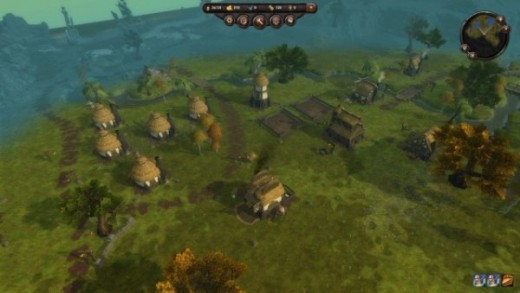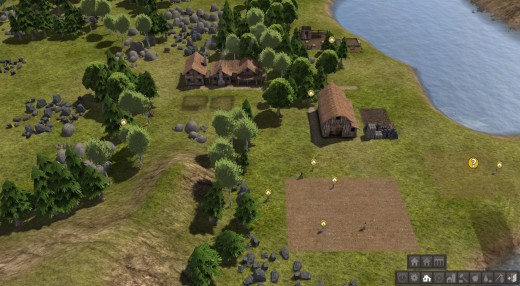It’s been a long time since I’ve published a design meditation. Let’s see if this brain still works after a year of not blogging.
I like city-builders. I will play a wider range of incomplete and ill-thought city-builders than I will of almost any other strategy genre, and we all know how full of ill-thought ideas strategy gaming is. I won’t stick with most of these games for very long. City-builders are exceptionally hard to do well because a rewarding city-builder is deep and complex but also makes it easy to find out what is going wrong in your city – even if there is no easy way to fix it.
I’ve played a few different indie city-building games in the last year. The rather rough but enchanting Banished. The terrifying but only “anticipated” Clockwork Empires. The seemingly unsure of itself Folk Tale. The light and tablet-born 1849. And there’s Hearthlands, which I have just started playing, but it looks charming and 1997-ish.
City-builders are, at their core, puzzle and math flow games. I’ve often derided this on the podcast, since I have very little interest in solving for X when I should be keeping my residential and industrial sectors properly separated by orchards and parks. But each map and each scenario generally has a problem to solved that varies from game to game even as one variable remains almost always constant. SimCity is about taxes, not food; but food is the most important thing in Caesar.
Children of the Nile is about accumulating prestige – a resource you’ll find in almost no other comparable game. The Settlers games are about work flow; Cities XL is about resource exchanges. In every scenario or situation in these games, these are the X at the basis of the underlying algebra and the trick is how to turn a given algebraic formula into a win-condition.
Yeah, it’s not very sexy, but a well-run and well-built city in a game is a thing of great beauty, as many of you know. Start with barren land and watch the towers grow like flowers. The math underneath is central to a good design, and even a pretty overlay can’t save it in the long run. A charming theme might help make the sour math more flavorful, but all the cherry extract in the world can’t hide the worst cough medicine.
One of the big problems with city-building games is front-loading what the “puzzle” is. Smaller studios only have room for so many maps and so many variations, so they inevitably run into a situation where X, and the road to X, is figured out too easily and there is no second stage.
Banished is the best example of this. The backstory of some great tragedy leading to your hardy band of settlers being cast out of society and into a verdant green paradise would seem like a return to Eden if your crew had any idea how to feed themselves. And that is the “trick” to Banished – maintaining that balance between population growth and starvation. It’s slightly underdocumented, so the challenge can persist for a few sessions if you aren’t so impatient that you need to check for spoilers and tips online. But once your X is solved, there is very little in the way of a next-tier problem where X becomes something you need to maintain while meeting five or six other needs. You can support a leather industry and a blacksmith and a quarry, but the trade goods never get interesting, the city never moves beyond hamlet and your one-time Roanoake becomes a new Williamsburg – fit only to be a tourist attraction since it is hopelessly stuck in an ever changing cycle of contentment.
As I mentioned on the podcast, 1849 is a charming tablet game that is very easily solved once you find gold or silver on your land since there is literally no end to the wealth – fail states are a thing of the past. (Without gold or silver, things are a little trickier, but ultimately anything you mine is X – iron is turned to pickaxes which can be sold for a very high price). I like it very much, but, like Banished, there is no end game or advancement more interesting than keeping all the supply chain balls in the air. And, since it doesn’t take too long to get there and the visuals aren’t as striking as an Impressions city builder or anything Maxis has ever done, the purity of the math is sort of in your face.
Lack of clarity about what the endgame will look like is a reason I am a little bit cooler on Clockwork Empires (at this stage). Though your first steps are obvious (carpenter, then kitchen, then cloth), the range of chaotic influences like fish-men, bandits and the random map generator that gives you all the stone in the world but two clumps of iron mean that you will eke out a subsistence living for a while with no real clue as to how long it will take for the good stuff to show up. But I haven’t solved for X there yet, and since the game is still in development, I may not for some time.
We usually don’t think of city-builders as having end-games, probably because they are often sold as sandboxes that promise that you can build great things and see how these great things work; they’re digital Lego but the new Lego stuff with every piece having a specific place in the system (if you want traditional Lego, Minecraft is over there.) And I say this with the obvious caveat that my employer is publishing a new city-builder that I have barely had time to dabble with.
But for me, the build-up to greatness implies that the ending visual representation of a formula live up to the theme and the promises of the early game. Banished (which I still have a great deal of respect for!) ends with everyone living a comfortable life in a hamlet, so the scrapping for survival in the early game was the end in itself; living is its own reward. Very philosophical, but I fear it is an accidental insight and the truth is that the game just…stops.




It is so hard to get the right difficulty balance in city builders it seems. Without some external conflict, like the land grabs and threat of a military incursion in Anno / Dawn of Discovery / Settlers, you tend to reach a point where you can coast. But I tend not to like to feel that type of pressure in a city builder, so it’s a catch 22.
I just started playing Tropico 5 recently since it finally got cheap enough to gamble on since my expectations aren’t that high. I think I like the basic building mechanics in the tropico series quite a bit – layout and logistics matter. I like watching the little guys traveling along my roads to move goods around. Not enough little cargo haulers and your goods may start to build up. But the Tropico series (at least since 3) has always seemed to be too easy and once you figure out a workable build order it can more or less be applied to most maps.
The part I like least about Tropico 5 are the factions because it doesn’t always make sense. Some people whose needs seem to be mostly met are pissed off and become rebels, while others seem perfectly content. It’s just not easy to make sense of their behaviors which violates what you stated above – it should be clear to see what the problem actually is even if it isn’t easily solved.
Welcome back to your blog Troy. Glad to see that you’re writing again.
It really is nice to see regular updates here again. I was almost at the point where I would remove this blog from my regular tour of sites worth visiting (I don’t know or care about those fancy RSS thingies, whatever they are) – glad I didn’t do it!
Perhaps in Dwarf Fortress the X you’re solving for is sanity. Sanity for you tantrumming dwarves who just happen to need some weird elf-bit for their masterpieces, for your nobles’ bizarre ukases. And Sanity as a resource for the player, as precious as the attention you must parcel out in an RTS.
I’m not as much of a city builder person, but I found myself obsessively playing Pharaoh for a couple weeks last year, and put down some thoughts on it all.
I see SimCity as different from many of the others, as the entire economic system is kept abstract and away from the user. In others, you go mine iron because you can turn it into tools and weapons, catch fish to feed people, etc. There’s more a concrete economic engine that engages me better.
End games seem to be a constant problem with these. Settlers could drag out quite a bit when you’ve got what you need, and you’re just trying to convince the game to put good army where you need it to advance towards that gate. I quit Pharaoh on a mission that was solved except that it wanted about twice as much population as I had, and building up that was just too wearing.
I really hope I didn’t jinx it.
Anyone ever played a game called Utopia for Intellevision? That was the first sort of build up society strategy game that i ever played. What a gem that was. And that brings to mind Sea Battle, also for intellevision. What a gem of a military RTS that was as well…what fun i had back in those days with these games…and i had great fun with Nobunaga’s Ambition for the original Nintendo…